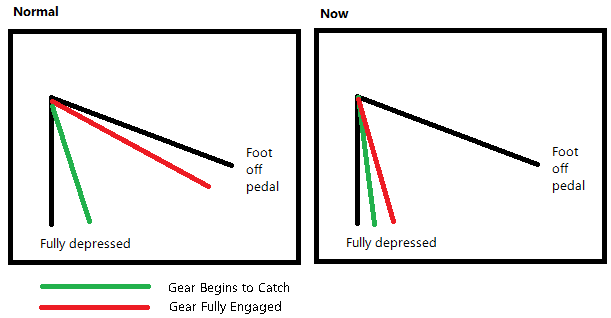I was headed home the other night, accelerating up to highway speeds, when suddenly I felt the clutch pedal completely change under me.
It previously started to catch at about the 1/4 way release point, and was fully engaged around the 3/4 out point (see pic). The clutch now catches nearly immediately -- around 1/8 out -- and is fully caught by the 1/4 out point.
Additionally, the entirely travel of the clutch FEELS different.. less like a rubber band and more like a spring.
I'm concerned that this is the first step in a much worse situation, so I've stopped driving the car.
This a 2001 1.8T Jetta. Some more relevant information -- clutch history.
- 1st clutch - original factory - from 0 to 176k miles
- 2nd clutch - (this clutch) - 176k to 257k miles (present)
This clutch is not the matching one for this car; it's the VR6 clutch, which is not dual mass (balanced) like the factory. There was a significant price difference, and aside from chatter, I had been told that the VR6 clutch could be used as a drop-in replacement. It's worked fine for the last 80k miles.
Is this an issue with the pedal mechanism, or with the clutch itself?
EDIT 1:
A coworker pointed out that the cylinder is shared by the braking system, and that a seal might have gone somewhere unrelated to the clutch. He said that If the brake/clutch fluid is a problem, the clutch will start to experience it first, before the brakes.

